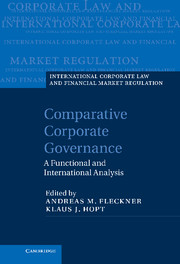Book contents
- Frontmatter
- Contents
- Contributors
- Preface
- Abbreviations
- Part I General report
- Part II National reports
- A Australia and Asia
- B Europe
- 6 Austria
- 7 Belgium
- 8 Denmark
- 9 Finland
- 10 France
- 11 Georgia
- 12 Germany
- 13 Hungary
- 14 Luxembourg
- 15 Netherlands
- 16 Norway
- 17 Poland
- 18 Portugal
- 19 Spain
- 20 Switzerland
- 21 United Kingdom
- C The Americas
- Part III Annex: Questionnaire
- Index
- References
20 - Switzerland
The system of corporate governance
from B - Europe
Published online by Cambridge University Press: 05 July 2013
- Frontmatter
- Contents
- Contributors
- Preface
- Abbreviations
- Part I General report
- Part II National reports
- A Australia and Asia
- B Europe
- 6 Austria
- 7 Belgium
- 8 Denmark
- 9 Finland
- 10 France
- 11 Georgia
- 12 Germany
- 13 Hungary
- 14 Luxembourg
- 15 Netherlands
- 16 Norway
- 17 Poland
- 18 Portugal
- 19 Spain
- 20 Switzerland
- 21 United Kingdom
- C The Americas
- Part III Annex: Questionnaire
- Index
- References
Summary
Background information
Swiss company laws provide for the distinction between corporate organizations and partnership organizations. The latter are outside the scope of this chapter; the former category consists of stock corporations (“corporations”) and of limited liability companies (“LLCs”). Unlike in Germany, the LLCs do not bear the same weight in Switzerland as corporations. Moreover, all listed companies are corporations.
This chapter will cover the legal aspects of corporate governance for corporations.
General information on corporate governance
Definition of corporate governance and Swiss corporate law reforms
Switzerland does not have any official definition of corporate governance. In fact, corporate governance is not a legal term under Swiss law. Most erudite commentaries pertaining to corporate law matters state that the term seems unclear and try to explain corporate governance by referring to several international reports (for example, to the Cadbury Report) and their definitions and to one particular Swiss code.
In substance, the academic definition combines on one side internal corporate governance (i.e., management, board of directors, auditors, and their relations) and on the other side external corporate governance (i.e., relations with capital markets, customers, and employees).
- Type
- Chapter
- Information
- Comparative Corporate GovernanceA Functional and International Analysis, pp. 868 - 912Publisher: Cambridge University PressPrint publication year: 2013
References
- 2
- Cited by

